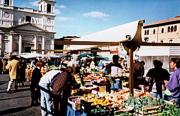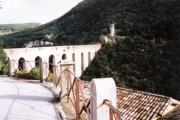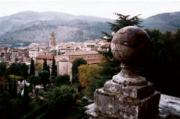I was hesitant to write about Abruzzo, because Ian and I seemed to form the whole of its foreign tourist contingent and I liked that. Please don’t get mobs going there.
Unless stated, any sites here are in l’Áquila Province.
|
 |
 |
 |
 |
 |
 |
 |
 |
Piazza and market, L'Aquila
 |
 |
Why did we go to L’Áquila? Easy, Ian’s son and his family live there. Why did we stay there for our whole trip? We hadn’t meant to lean on the family for so long but Ian was very ill there and unfortunately spent most of his holiday in bed. It was my good luck that the family was so hospitable.
Don’t get the idea That Abruzzo gets no outsiders – plenty of Romans have holiday cottages in the area. Whereas it’s this wonderful mountain area as a whole that grabs me, L’Áquila itself has plenty to commend it. Its castle [guarded by a mastadon!] is now a museum and it’s in a park with fabulous views over to the Gran Sasso d’Italia. Then there is the fountain of 99 spouts and two outstanding churches, Santa Maria di Collemaggio and S. Bernardino di Siena. The main square [piazza] has a produce market every morning – it attracts crowds in near promenade on a Sunday. There are other attractive churches and mansions in the Old Town. When I was there [Nov 1998] it had the dubious honour of being the largest town in Italy without a bus station – apparently it has a very good one now. If it’s appropriate for your journey, however, the really enjoyable travel for its own sake is by the branch rail line from Terni and Rieta through Sulmona into the Abruzzi National Park. The scenery in both directions is a delight.
One good trip out is the slow bus route to Avezzano, through the Alto Piano [high plateau], followed by a return local bus trip to the outstanding mountain village of Tagliacozzo and then back by the direct bus route from Avezzano to L’Áquila.
In the suburb of Coppito is a ruined amphitheatre, just by the road and free. It may not be like Arles or Nimes but many European countries would be grateful for a site like it. A short local bus ride also takes you up to the funicular that sane walkers use to start on the Gran Sasso [closed between summer and ski seasons].
Excellent website: http://www.aquila.infn.it/aquila/
|
|
| Favourite spots: |
|
This is a real knock-out, the little village of Bominaco, connected to l’Áquila by bus. The ride is great, but that’s characteristic of the area. You drop down from l’Áquila and get on the road for Sulmona. Later you turn right and start to rise – and rise. Only about three km short of Bominaco is a town [I forget its name] which has a poster up proclaiming its monuments – you could probably walk down and see it after you have been to Bominaco and pick up a return bus there. Bominaco has not one but two small Romanesque churches. Santa Maria is a lovely simple building with three apses and would be stunning if it were not for the particular claims to fame of its neighbour, San Pellegrino. The Romanesque frescoes here are a national treasure. Naturally photography in the church is banned but you can get some idea from www.abruzzoverdeblu.-id/?id=25. Click on Oratorio S Pellegrino under lÁquila. It is only a short walk up to the castle, from which the view has to be glorious.
|
|
| What's really great: |
|
Here, what’s special? What isn’t? Here are some. SANTO STEFANO – a tiny village where at one point, around the watchtower, only one reasonably thin person can pass at a time. Small lake below easy to walk around. SULMONA – A very pleasing town where I spent my only night out. There is a fine aqueduct around two sides of the main square. This was the birthplace of the Roman poet, Ovid. His nickname was ‘Naso’ for obvious reasons connected with the size of his snout – but the statue of him in the square near the Cathedral shows quite an ordinary nose! SCANNO – A village with its own bus to Rome. STEEP streets, old, narrow and often stepped, with a lake far below. NATIONAL PARK – Headquarters and information at Pescasseroli. Scenically stunning. Wolves and bears are still here though not often seen. The bus driver spotted a wolf near Scanno but I was too late. SCOPITTO – where we stayed, with fabulous views of the Gran Sasso and delightful local strolls.
|
|
| Sights: |
 |
 |
 |
 |
 |
 |
 |
 |
Ponte delle Torre, Spoleto
 |
 |
My one intended trip out of Abruzzo was to Spoletto in Umbria by rail via Terni. This would make another great place to stay. Unfortunately the Cathedral was swamped by scaffolding and nets but there’s so much to see that it hardly mattered.
From the station, if you are only going for the day, don’t waste time and get a bus to the old city. There is a Roman villa of the 1st century AD, numerous historic churches and some fairly spectacular Roman remains.
However, to me the special feature of the place is at the top. There is a path without any slope running right round the hilltop fort and on the far sight is a marvel, This is the Ponte delle Torre, a long 14th century bridge built on the basis of an aqueduct.
I strongly urge you to click on some of the photos on
http://www.photo vault.com/Link/Cities /Europe/Italy/Places /Spoleto.html [no gaps of course, only there to beat the 40-letter word limit]
|
|
| Accommodations: |
 |
 |
 |
 |
 |
 |
 |
 |
View from castle, l'Áquila
 |
 |
I only spent one night out and I’m afraid I don’t remember the name of the hotel in Sulmona. It was right by the cathedral down a sort of alley from the square and very acceptable.
|
|
| Restaurants: |
Ditto to accommodations for Sulmona – pity because it was really good but if it’s Monday you’ll find it!
I went out to eat with the family while Ian had his necessary solitude in their house on the Sunday. This was in a little restaurant on the lake side of Santo Stefano. I forget the name again but it was delicious food, moderately priced, and there’s nothing to confuse it with.
|
|
| Other recommendations: |
One I didn’t manage to visit was Castelli in Teramo Province [Abruzzo still] on the other side of a tunnel through the mountains. Ian’s family recommended it highly for art and particularly ceramics.
Another was Calascio, with stupendous views, an old octagonal church and a wonderful citadel [the Rocca] frequently used for films.
I did get fairly easily to Tivoli in Latio, on a foul day in the mountains [bus to Rome, train to Tivoli (great ride), train to Avezzano, bus back.] for long enough to visit the Villa d’Este – but not time for the Villa d’Adriano. The Villa d’Este is fine in itself but its gardens and fountains are terrific.
Avezzano has no real interest, following an earthquake, but is an excellent transport centre.
If you want to visit Rome without the hassle of staying there, the direct bus from l’Áquila could give you a long day.
|
|
Published on Tuesday January 18th, 2005
|
|
 Publish on Facebook
Publish on Facebook
|
Fri, Feb 25 2005 - 04:29 PM
 by mtlorensen
| Wonderful report and pictures! |
Fri, Jan 21 2005 - 11:59 AM
 by marianne by marianne
Wow david, you are prolific! Beautiful pictures and excellent writing. (but I said so before)
Marianne |
Thu, Jan 20 2005 - 02:46 AM
 by gloriajames by gloriajames
| a wonderful report again! |
Wed, Jan 19 2005 - 09:52 PM
 by magsalex by magsalex
Wed, Jan 19 2005 - 10:36 AM
 by mistybleu by mistybleu
Great pictures and a nice report.
Misty |
Wed, Jan 19 2005 - 03:41 AM
 by ravinderkumarsi by ravinderkumarsi
hii david,
now a days i always look for ur reports which are simply great.
keep it up
ravi |
| Information: |
| Login if you are a member, or sign up for a free membership to rate this report and to earn globo points! |
|
| Belgium |
|
|
|
|
 |
| Bosnia - Herzegovina |
|
|
 |
| Croatia |
|
|
|
|
 |
| Czech Republic |
|
|
 |
| Faroe Islands |
|
|
|
|
|
|
 |
| Finland |
|
|
|
|
|
|
 |
| France |
|
|
|
|
|
|
|

|
